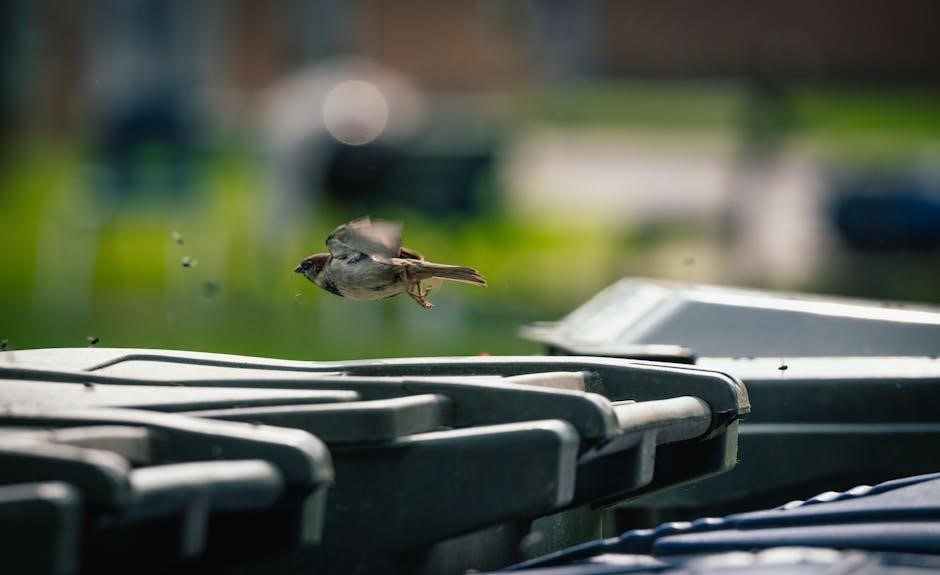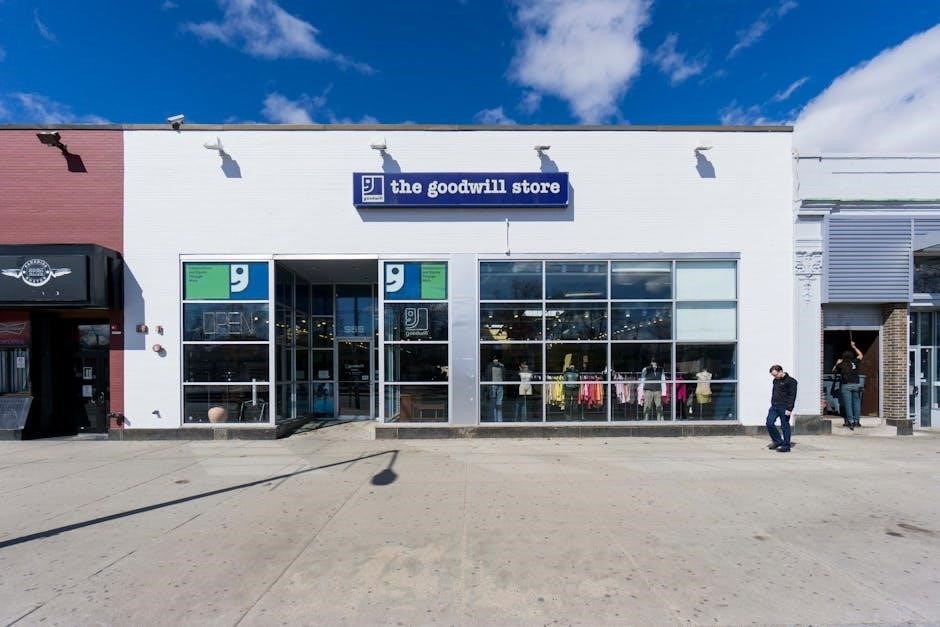Boston’s recycling guide provides essential information on sustainable waste management, helping residents reduce environmental impact through proper recycling practices and community engagement.
Discover how to participate effectively in Boston’s recycling programs, ensuring a cleaner, greener city for future generations.
Overview of Boston’s Recycling Program
Boston’s recycling program is designed to promote sustainable waste management through curbside collection and community engagement. Residents are provided with 64-gallon recycling bins, and the city aims to reduce waste by 90% by 2050. The program includes composting initiatives and clear guidelines on acceptable materials, excluding items like plastic bags. By focusing on proper recycling practices and educating the community, Boston strives to create a cleaner, greener environment for future generations.
Importance of Recycling in Boston
Recycling plays a vital role in maintaining Boston’s environmental health and sustainability. By reducing landfill waste, it helps conserve natural resources and decreases greenhouse gas emissions. The city aims to decrease trash by 90% by 2050, making recycling a key component of this goal. Proper recycling practices also support public health and foster a cleaner, more livable community. Through education and participation, residents can contribute to a greener future, ensuring Boston remains a sustainable and environmentally conscious city for generations to come.

What Can Be Recycled in Boston
Boston accepts paper, cardboard, glass, metal, and plastic containers in curbside recycling. Items like plastic bags and non-recyclable plastics are excluded. Use the Recyclopedia for specific guidance.
Acceptable Materials for Curbside Recycling
Boston’s curbside recycling program accepts paper, cardboard, glass bottles, metal cans, and plastic containers. Flatten cardboard and rinse containers before recycling. Avoid plastic bags, non-recyclable plastics, and food waste. Use the provided 64-gallon bins with lids for collection. Properly sort materials to ensure efficient processing. Check the city’s Recyclopedia for specific guidelines on acceptable items. Improperly prepared or non-recyclable materials may not be collected. Follow these guidelines to contribute effectively to Boston’s sustainability goals and maintain a cleaner environment for all residents.
Special Items and Hazardous Waste Disposal
Boston provides specific guidelines for handling special items and hazardous waste. Items like batteries, electronics, and chemicals require special disposal. Hazardous waste, including paints and pesticides, should not be placed in curbside bins. Residents can use the city’s hazardous waste collection facilities or attend designated drop-off events. E-waste, such as computers and phones, can be recycled at special locations. Check the city’s website for acceptable materials and collection schedules. Proper disposal of these items ensures environmental safety and compliance with local regulations, helping to protect Boston’s communities and ecosystems from harmful waste.

Recycling Collection Schedule and Guidelines
Recycling collection in Boston occurs weekly, with specific days for trash and recycling. Residents must place bins curbside by 7 AM on collection days for pickup.
Trash and Recycling Pickup Times
Trash and recycling collection in Boston follows a structured schedule to ensure efficiency. Recycling is collected weekly, typically on Tuesdays, while trash pickup occurs on Tuesdays and Fridays. Residents must place bins curbside by 7:00 AM on collection days to guarantee service. Proper placement and adherence to bin lid requirements are crucial to avoid missed pickups. The city emphasizes timely and organized waste management to maintain cleanliness and sustainability. For specific schedules, residents can refer to the official Boston recycling guide or the city’s website, which also provides updates on holiday schedules and special collection events.

Proper Preparation of Recyclables
Proper preparation of recyclables is essential for effective recycling in Boston. Residents must ensure materials are clean, with food and liquid residues removed. Cardboard boxes should be flattened, and boxboard items like paper towel rolls must be bundled. Glass, metal, and plastic containers should be emptied and rinsed. Plastic bags, straws, and foam are not recyclable and should be excluded; Items must be placed loosely in bins or paper bags; string and plastic bags should not be used. Proper preparation ensures materials are processed efficiently, contributing to a successful recycling program. Refer to the city’s guide for specific preparation guidelines.

Recycling Drop-Off Locations and Services
Boston offers convenient recycling drop-off locations and services, including city-operated facilities and at-your-door special collections, to ensure proper disposal of recyclables and hazardous waste.
City-Operated Recycling Facilities
Boston operates several recycling facilities, such as the South Boston Recycling Center, where residents can drop off materials like paper, cardboard, glass, metal, and plastic. These facilities accept clean, sorted recyclables, excluding items like plastic bags and Styrofoam. Residents are encouraged to rinse containers and remove lids before depositing. Operating hours vary, but most centers are open on weekends. Visit the city’s website for a full list of locations and guidelines. Proper use of these facilities helps ensure materials are recycled efficiently, supporting Boston’s sustainability goals.

At-Your-Door Special Collection Services
Boston offers at-your-door special collection services for bulk items, hazardous waste, and electronics. Residents can schedule pickups online or by phone for materials like furniture, appliances, and batteries. This service ensures safe disposal of items that cannot be placed in regular trash or recycling bins. Proper preparation, such as storing hazardous materials in sealed containers, is required. This convenient program helps residents manage hard-to-recycle items responsibly, supporting the city’s waste reduction and sustainability efforts. Visit Boston’s official website for eligibility criteria and scheduling details.

Community Engagement and Education
Boston fosters recycling awareness through workshops, events, and educational resources, empowering residents with knowledge to contribute to a sustainable future.
Workshops and Events Promoting Recycling
Boston hosts interactive workshops and community events to educate residents on recycling best practices, encouraging participation and sustainability. These events feature hands-on demonstrations, Q&A sessions, and family-friendly activities to engage all ages. By fostering awareness and providing practical tools, the city aims to increase recycling rates and reduce waste. Workshops often focus on proper sorting techniques, reducing contamination, and exploring innovative ways to reuse materials. Additionally, local organizations and experts collaborate to share insights, helping residents make informed decisions about recycling. These initiatives play a crucial role in building a more sustainable future for Boston.
Educational Resources for Residents
Boston provides comprehensive educational resources to help residents understand and participate in recycling programs. The city offers a detailed Guide to Waste and Recycling in PDF format, available online, which outlines acceptable materials and collection guidelines. Additionally, residents can utilize tools like Recycle Coach to receive personalized recycling information. Educational materials include tips on proper preparation of recyclables, such as rinsing containers and avoiding plastic bags. Workshops and events further enhance knowledge, encouraging residents to recycle smartly. By leveraging these resources, Bostonians can contribute effectively to the city’s sustainability goals.

Frequently Asked Questions About Recycling in Boston
Residents often inquire about acceptable materials, collection schedules, and proper preparation of recyclables. The city’s guide clarifies these points, ensuring efficient and effective recycling practices.
Common Queries and Clarifications
Residents often ask about acceptable materials, with plastic bags and Styrofoam being notable exceptions.
Collection schedules, such as recycling being picked up on Tuesdays, are also frequently questioned.
Clarifications emphasize proper preparation, like rinsing containers and flattening cardboard.
Questions about hazardous waste disposal and special collection services are common.
The city’s guide addresses these concerns, ensuring residents understand how to recycle correctly.
For more details, residents can refer to the official Boston Recycling Guide.
Misconceptions About Recycling Practices
A common myth is that plastic bags and straws are recyclable, but they often disrupt processing systems.
Some believe all plastics are acceptable, yet only certain types are recyclable in Boston.
Another misconception is that recyclables can be placed in plastic bags, which contaminates the stream.
Additionally, many think food residue on containers is acceptable, but items must be clean.
Clarifying these misunderstandings helps improve recycling efficiency.
Always verify acceptable materials in the Boston Recycling Guide to ensure proper practices.

Future Initiatives and Goals for Boston Recycling
Boston aims to expand composting programs and increase recycling rates, targeting a 90% waste reduction by 2050 to align with sustainability goals and environmental stewardship.
Expanding Composting and Recycling Programs
Boston is committed to expanding its composting and recycling initiatives to reduce waste significantly. The city aims to increase participation in food scrap and yard waste composting programs, diverting organic materials from landfills. By educating residents and businesses, Boston hopes to enhance recycling rates and promote sustainable practices. Additionally, the city plans to improve infrastructure for recycling collection, making it more accessible and efficient for all communities.
These efforts align with Boston’s long-term goal of achieving a 90% reduction in waste by 2050, fostering a cleaner and more environmentally conscious city for future generations.
Targets for Reducing Waste by 2050
Boston has set ambitious targets to reduce waste by 90% by 2050, aligning with global sustainability goals. The city focuses on enhancing recycling infrastructure, expanding composting programs, and increasing public awareness. Strategies include improving curbside collection, promoting zero-waste initiatives, and investing in education to encourage responsible waste management. By achieving this target, Boston aims to significantly decrease landfill use and contribute to a healthier environment for future generations.
These efforts highlight Boston’s commitment to becoming a leader in sustainable urban development and environmental stewardship.
